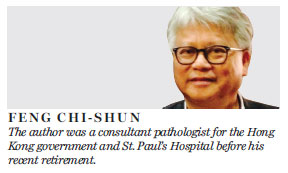Public needs Voluntary Health Insurance Scheme
Updated: 2015-04-24 07:34
By Feng Chi - Shun(HK Edition)
|
|||||||
The Voluntary Health Insurance Scheme (VHIS) proposed by our government aims to provide value-for-money medical insurance for the middle class, especially those in their golden years and those with existing chronic diseases. In spite of our excellent public hospital service, people with medical insurance usually opt for private healthcare for the same reasons they prefer a 5-star hotel rather than a guest house if they have a choice and the means. Even though the end result may be the same, the difference is in the service, expediency, and comfort.
When VHIS becomes available, I'll be the first to sign up because I am aging, and the medical insurance for which I am currently paying big bucks, doesn't cover pre-existing conditions of which I have plenty. And when I reach a certain older age, protocol requires them to unceremoniously discontinue my policy altogether. VHIS will have none of those restrictions and is cheaper, thanks to our government's generous subsidy.
VHIS will benefit many citizens, directly for those who subscribe to it, and also indirectly for citizens who prefer using our public healthcare facilities. By moving many of the patients into the private sector, VHIS will bring a degree of relief to the heavy workload of our overstretched public hospitals, consequently improving their services for those using them. VHIS is a good thing, yet numerous individuals spoke up against it during the public consultation period.
Chan Kin-por, the insurance industry legislator, commented that of the 1.85 million people currently carrying health insurance, half were paying less than HK$3,000 a year, cheaper than the proposed basic annual premium of HK$3,600 for VHIS. "More than a million current subscribers of health insurers will not be able to afford VHIS," he added. But insurance companies can certainly continue to sell different insurance products, and everyone is free to choose any of them and not VHIS, which may be a little more expensive but is a better product than most. My question to the honorary legislator is: Which part of "voluntary" in VHIS do you not understand?
Another legislator, Kwok Ka-ki of the Civic Party, criticized the government for pushing patients from the public sector into the private sector. Given that 40 percent of doctors in the public section are taking care of 90 percent of inpatients now, the consensus is that we somehow need to offset the unhealthy imbalance. The government is trying to alleviate the workload of public healthcare workers by making citizens who can afford reasonably priced insurance policies, use private healthcare and avoid overburdening the public healthcare facilities. So, is Kwok against this? Also, he said the government was only helping the rich old citizens by promoting VHIS. I have news for him; really rich old people don't need to buy health insurance.
The President of Hong Kong Medical Association (HKMA), Shih Tai-cho, told members that he objected to the scheme, because he thought the government should put more money and effort into primary healthcare. On a radio program, he brought up the issues of governance and fee transparency in private hospitals when asked about what he thought of VHIS. The healthcare issues he brought up are certainly important, but are only remotely relevant to the current government proposal under discussion. HKMA conducted a survey on VHIS among its members. As with all surveys involving HKMA, the results are suspect because they are usually self-serving and unhelpful to the general public. The members worried about sustainability of the project. The government has put aside HK$4.3 billion to fund the project, which will be enough to sustain 25 years of the subsidy. At my age, 25 years is an eternity. In the same survey, the majority of doctors in HKMA thought they wouldn't join VHIS because they were already sufficiently covered, and those working for the Hospital Authority thought they would rather seek medical treatment on their home turf. They are well taken care of, I'm sure. But what about the rest of us?
Everyone in Hong Kong is a critic, especially when it comes to government policies. I suggest whenever our government comes up with a good idea, it should think it through, and then implement it without delay. There is no need for public consultation.

(HK Edition 04/24/2015 page10)